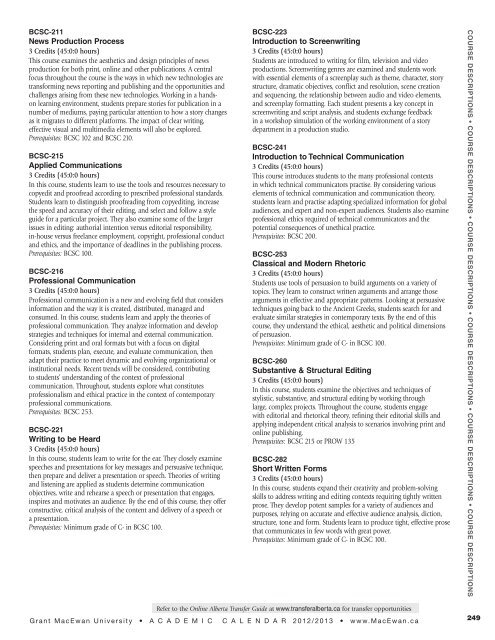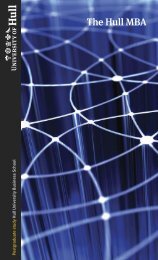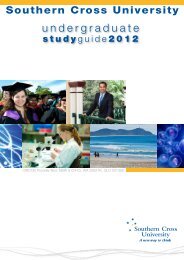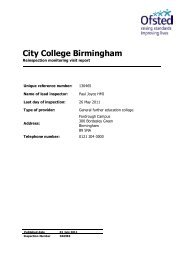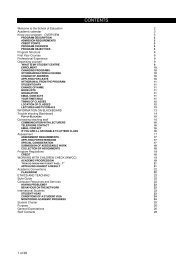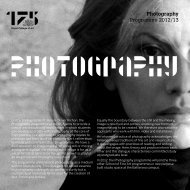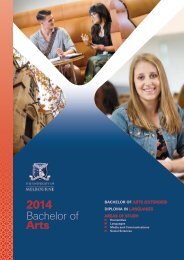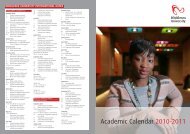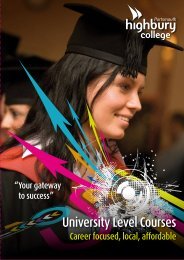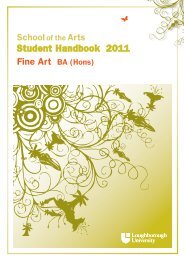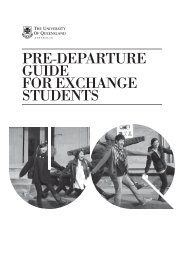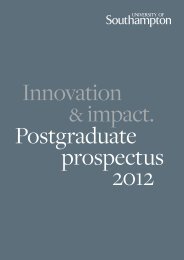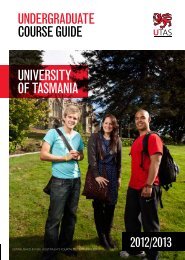Academic Calendar 2012/2013
Academic Calendar 2012/2013
Academic Calendar 2012/2013
You also want an ePaper? Increase the reach of your titles
YUMPU automatically turns print PDFs into web optimized ePapers that Google loves.
BCSC-211News Production Process3 Credits (45:0:0 hours)This course examines the aesthetics and design principles of newsproduction for both print, online and other publications. A centralfocus throughout the course is the ways in which new technologies aretransforming news reporting and publishing and the opportunities andchallenges arising from these new technologies. Working in a handsonlearning environment, students prepare stories for publication in anumber of mediums, paying particular attention to how a story changesas it migrates to different platforms. The impact of clear writing,effective visual and multimedia elements will also be explored.Prerequisites: BCSC 102 and BCSC 210.BCSC-215Applied Communications3 Credits (45:0:0 hours)In this course, students learn to use the tools and resources necessary tocopyedit and proofread according to prescribed professional standards.Students learn to distinguish proofreading from copyediting, increasethe speed and accuracy of their editing, and select and follow a styleguide for a particular project. They also examine some of the largerissues in editing: authorial intention versus editorial responsibility,in-house versus freelance employment, copyright, professional conductand ethics, and the importance of deadlines in the publishing process.Prerequisites: BCSC 100.BCSC-216Professional Communication3 Credits (45:0:0 hours)Professional communication is a new and evolving field that considersinformation and the way it is created, distributed, managed andconsumed. In this course, students learn and apply the theories ofprofessional communication. They analyze information and developstrategies and techniques for internal and external communication.Considering print and oral formats but with a focus on digitalformats, students plan, execute, and evaluate communication, thenadapt their practice to meet dynamic and evolving organizational orinstitutional needs. Recent trends will be considered, contributingto students’ understanding of the context of professionalcommunication. Throughout, students explore what constitutesprofessionalism and ethical practice in the context of contemporaryprofessional communications.Prerequisites: BCSC 253.BCSC-221Writing to be Heard3 Credits (45:0:0 hours)In this course, students learn to write for the ear. They closely examinespeeches and presentations for key messages and persuasive technique,then prepare and deliver a presentation or speech. Theories of writingand listening are applied as students determine communicationobjectives, write and rehearse a speech or presentation that engages,inspires and motivates an audience. By the end of this course, they offerconstructive, critical analysis of the content and delivery of a speech ora presentation.Prerequisites: Minimum grade of C- in BCSC 100.BCSC-223Introduction to Screenwriting3 Credits (45:0:0 hours)Students are introduced to writing for film, television and videoproductions. Screenwriting genres are examined and students workwith essential elements of a screenplay such as theme, character, storystructure, dramatic objectives, conflict and resolution, scene creationand sequencing, the relationship between audio and video elements,and screenplay formatting. Each student presents a key concept inscreenwriting and script analysis, and students exchange feedbackin a workshop simulation of the working environment of a storydepartment in a production studio.BCSC-241Introduction to Technical Communication3 Credits (45:0:0 hours)This course introduces students to the many professional contextsin which technical communicators practise. By considering variouselements of technical communication and communication theory,students learn and practise adapting specialized information for globalaudiences, and expert and non-expert audiences. Students also examineprofessional ethics required of technical communicators and thepotential consequences of unethical practice.Prerequisites: BCSC 200.BCSC-253Classical and Modern Rhetoric3 Credits (45:0:0 hours)Students use tools of persuasion to build arguments on a variety oftopics. They learn to construct written arguments and arrange thosearguments in effective and appropriate patterns. Looking at persuasivetechniques going back to the Ancient Greeks, students search for andevaluate similar strategies in contemporary texts. By the end of thiscourse, they understand the ethical, aesthetic and political dimensionsof persuasion.Prerequisites: Minimum grade of C- in BCSC 100.BCSC-260Substantive & Structural Editing3 Credits (45:0:0 hours)In this course, students examine the objectives and techniques ofstylistic, substantive, and structural editing by working throughlarge, complex projects. Throughout the course, students engagewith editorial and rhetorical theory, refining their editorial skills andapplying independent critical analysis to scenarios involving print andonline publishing.Prerequisites: BCSC 215 or PROW 135BCSC-282Short Written Forms3 Credits (45:0:0 hours)In this course, students expand their creativity and problem-solvingskills to address writing and editing contexts requiring tightly writtenprose. They develop potent samples for a variety of audiences andpurposes, relying on accurate and effective audience analysis, diction,structure, tone and form. Students learn to produce tight, effective prosethat communicates in few words with great power.Prerequisites: Minimum grade of C- in BCSC 100.course Descriptions • course Descriptions • course Descriptions • course Descriptions • course Descriptions • course DescriptionsGrant MacEwan University • A C A D E m I CRefer to the Online Alberta Transfer Guide at www.transferalberta.ca for transfer opportunitiesC A L E N D A R <strong>2012</strong>/<strong>2013</strong> • www.MacEwan.ca249


